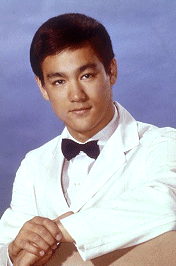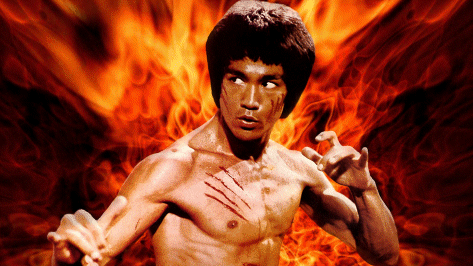Sixties
City presents
a wide-ranging series of
articles on all aspects of the Sixties, penned by the creator of the iconic
60s music paper Mersey
Beat
|
Sixties
City presents
a wide-ranging series of
articles on all aspects of the Sixties, penned by the creator of the iconic
60s music paper Mersey
Beat
|
|||||
|
 |
His
parents returned to Hong Kong with their family, which included Bruce’s
elder sisters Agnes and Phoebe, elder brother Peter and younger brother
Robert. Bruce appeared in his first Hong Kong movie ‘Birth of a Man’ at the age of six and began to appear regularly in films made in the colony. In his teens he was offered a contract by the Shaw Brothers, Hong Kong’s biggest producers, but his mother disagreed and sent him back to America to be educated. Following a brief spell at Edison High Technical School, Seattle, he moved to the University of Washington. Bruce had been studying Kung Fu, a method of fighting which had been developed by Shaolin Temple monks in China. As a child he had been taught Tai Chi Chuan by his father and his interest in martial arts grew to the extent that he opened his own martial arts school and, in the early Sixties, wrote a book called ‘Chinese Gung-Fui: the Philosophical Art of Self Defence.’ In 1964 he married Linda Emery and moved to California where his martial arts school became so popular that several branches were opened. In 1966 he was offered the part of Kato in ‘The Green Hornet’ television series and, although the project was to last only a year, he made quite an impression with his use of martial arts which had rarely been seen on the American screen. This was to lead to his debut in an American movie – ‘Marlowe’, starring James Garner, in which he was also called upon to use his martial arts skills. He returned to Hong Kong to make several more martial arts films, beginning with ‘The Big Boss’, and was also contracted to star in the first major American martial arts film, ‘Enter the Dragon.’ The popularity of these films created a new genre and throughout the Seventies there were literally hundreds of martial arts films produced internationally. Tragically, by this time, Lee was dead. His body was found in the apartment of actress Betty Ting Pei on 20th July 1973 and his death was said to have been caused by a cerebral haemorrhage. Most of the martial arts films that followed were to capitalise on Lee and his major film ‘Enter The Dragon.’ Stars included Bruce Li, Bruce Le, Bruce Liang, Bruce Leong, Bruce Lei, Bruce Rhe, Dragon Lee, Rocky Lee, Bronson Lee, Conan Lee and Jet Li in films such as ‘Exit the Dragon’, ‘Enter The Tiger’ and ‘The Dragon Dies Hard'. |
 |
 |
|
Article
Text
UK
web hosting by
|